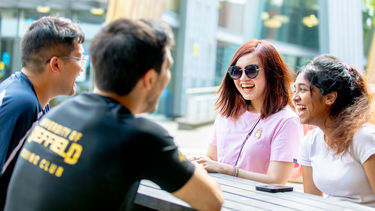Postgraduate study is a big commitment, but the benefits can be immeasurable

What made you decide to study Acquired Communication Disorders at the University of Sheffield?
“Having been in my current role for seven years, I was starting to feel a yearning to do something ‘different’ to the normal day-to-day routine. I didn’t want to leave my team or my post, so I decided to look at further study options instead, and after a bit of research looking at courses across the UK and Ireland I chose Sheffield.
“My client group all have acquired, non-progressive conditions, but how it affects their clinical presentation and their communication varies wildly, so the opportunity to study within those broad parameters really appealed to me. I wanted to look ‘beyond’ their diagnosis and more at the impact, and the course offered a really flexible approach to this.
“The faculty itself was another HUGE attraction - I had either read publications or, in one case, attended a study day hosted by various members of the faculty, and the thought of being able to tap into even a small part of their knowledge, skills and experience was too attractive to overlook.”
What knowledge and skills have you developed during your course? How has it developed your working practice?
“First and foremost, I got really good at finding, evaluating and questioning research publications to judge whether there was something that I could apply to clinical practice. This is a crucial skill when, as a profession, we are taught to apply an evidence base to our practice. Evaluating possible treatment options for use with my clients has really sped up, and I feel much more confident in my ability to do that quickly. It’s also given me the courage and the evidence to make the case for some slightly ‘different’ training opportunities, with a focus on the background condition rather than the speech and language diagnosis.
“In terms of career opportunities, it definitely adds to my CV and my skill set and this will make me feel more comfortable and confident if – or when – I see vacancies higher up the career ladder than where I’m currently sitting. Feedback from my managers is that my critical thinking about cases has also really improved.”
How did studying part-time help you with work, academic and family life?
“I have a very supportive manager who was happy to give me the time to travel and attend teaching in Sheffield and let me take some study days around assignment deadlines. Without that support I’m not sure how feasible it would have been to work full time and keep up with in-person study. That said, having teaching blocks at the start of term with weekly or fortnightly material releases, was a great approach as it focused the mind without seeming like an overwhelming amount of work.
“Everything transferred online in 2020 due to COVID, which was, in some ways, harder for me as I found it difficult to motivate myself in the face of other demands at home. Having said that, the opportunity to link in remotely with my supervisor for my dissertation was excellent and being able to organise our meetings at times that suited us both worked well; I’m not sure that would have worked as smoothly if it would have had to be in person.
“Some unforeseen events along the way ultimately required me to change my pathway, switching from two to three years - the staff were excellent and really supportive, and did everything they could to make sure I was able to complete the course.
All in all, I managed to complete the course with minimal impact on my home life - I don’t think I missed my son’s bedtime once.
Paddy Moriarty
What would you say to a student thinking about studying this course at the University of Sheffield?
“Postgraduate study is a big commitment, but the benefits, both personally and professionally, can be immeasurable. There’s a big load on you to motivate yourself to keep working in the background, so really look at whether your home and work life are compatible with taking it on.
The faculty and teaching at Sheffield are excellent and really supportive, and I’d really heavily recommend them to anyone at the same crossroads as I was a few years ago.
Paddy Moriarty
“If – and that’s a big IF – I decide to do any further study, then the University of Sheffield will be the first (and quite possibly last!) prospectus I look at.”

International scholarships
We offer a generous package of financial support for international students, including undergraduate and postgraduate taught scholarships towards the annual tuition fee. Applications are open for existing offer holders.

